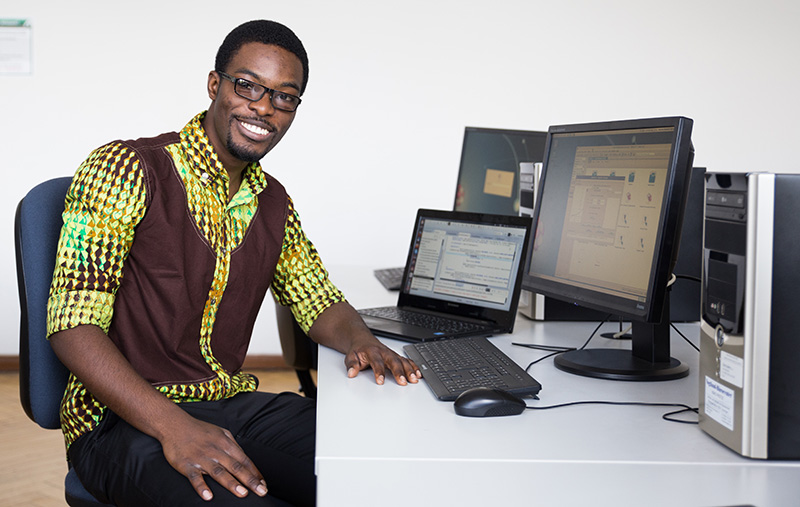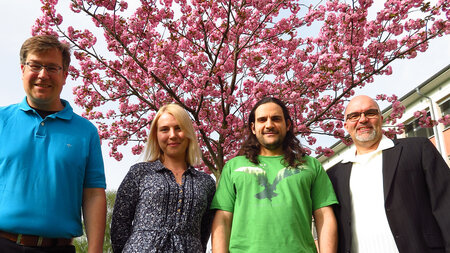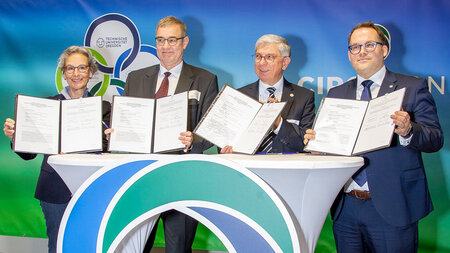Electronics, not Mechanics
Students in the Automotive Software Engineering Master degree program learn how to make automotive industry software innovations faster, safer, and more user-friendly
-

Automotive Software Engineering Master student Kwame Nseboah Nyarko has studied at the TU Chemnitz since October 2012. In the Straße der Nationen computer lab, the native Ghanaian gets ready for a seminar. Photo: Steve Conrad
The proportion of electronics, software and control devices in cars has grown dramatically in the last few decades and has become a significant driver of innovation in the automotive sector. Over 90 percent of the innovation in vehicles are driven by electronics and software. The advantages of software-based and networked functions are clear: they make the vehicle safer, more user-friendly and more comfortable. At the same time, the realization of functions through software offers an exceptional level of freedom in the design process. For these developments, a specially trained technician is required, who has mastered the interplay of automotive software and technical processes. Amr Hegazi is one such technician. The 23-year-old studies in the Automotive Software Engineering Master program at the TU Chemnitz and came specifically from his home in Egypt to Saxony for this program. “Software engineering is my favorite field in my studies, in which I would later also like to work. During my Bachelor studies at the University of Cairo, I specialized in communication and technical computer science and in my Bachelor’s thesis I focused on on-board diagnostics systems in automotive systems. In order to be well prepared for my career path, I would like to strengthen my technological background knowledge here,” says Hegazi. Kwame Nseboah Nyarko, born in Ghana, has also been enrolled in the Technische Universität Chemnitz Automotive Software Engineering Master program since October 2012. Previously, he completed his Bachelor studies in electrical engineering at the Kwame Nkrumah University of Science and Technology in Ghana. “After finishing my Bachelor studies, I looked for high quality and prestigious Master programs in Germany. The TU Chemnitz combines quality in research and instruction with low study costs. My decision was quickly made,” remembers the 29-year-old engineer, who is currently writing his Master’s thesis.
With the Automotive Software Engineering Master program, students can specialize in software development in the application field of automotive engineering and obtain advanced knowledge of computer science, applied computer science and information and communication technology. “Even though the range of subjects in our study program is really broad, we have the possibility to study our preferred disciplines in more depth,” Hegazi explains and continues: “For example, one special focus is intelligent mobility. This innovation is a reaction to the needs of companies who are advancing new concepts of mobility. Speed, safety and comfort are just as much in the foreground as efficiency and the environment.” His fellow student Nyarko is most enthusiastic about the options students have to specialize in their favorite topics during their studies: “I am very interested in intelligent machine control like robotics and distributed computing systems and I appreciate the opportunity to choose my courses freely. I have worked as a student assistant for a year now in the Department of Computer Science. I am there to provide assistance to students during exercises or internships in the laboratory and, in so doing, I even learn a lot myself about the various specialization fields offered in our department.”
The degree course is research-oriented, due to its integration in the Department of Computer Science’s key research area of embedded selforganizing systems. As a result, theoretical as well as practical content is taught in lectures and in small practice groups. Hegazi explains how the students are prepared to carry out challenging tasks in the field of technological development of motor vehicle, aircraft and mechanical equipment control systems: “What makes the Automotive Software Engineering Master program so special is the division into two branches. We learn not only how to program in various languages and from various different perspectives, but also relevant technological background knowledge like the functions of real-time operating systems. The demand for software engineers is currently very high, because new functionalities are being researched in all branches of automotive development. Therefore the Automotive Systems Engineering Master program prepares us well to occupy leadership positions in the employment market.” There are many other fields of work available to graduates of the study program in addition to the automotive industry, including the aerospace industry, mechatronic control systems and robotics.
Most courses are held in English and therefore offer international students the possibility to expand their software engineering knowledge and competency at the TU Chemnitz. “To my knowledge, there are more than 50 percent international students in our study program, but because of the wide range of English courses offered, there are hardly any language barriers in our courses. And if something isn’t quite clear, the competent instructors are always there to assist and advise,” praises the native Ghanaian Nyarko and Hegazi adds: “As a whole, the interculturality on the Chemnitz campus is very high. You can get to know lots of different cultures and make friends with students from all over the world. In order to master my everyday life outside of the university, I am taking a german course and improve my german knowledge day by day.”
(Author: Katharina Preuß, Translation: Sarah Wilson)
Katharina Thehos
17.09.2015





